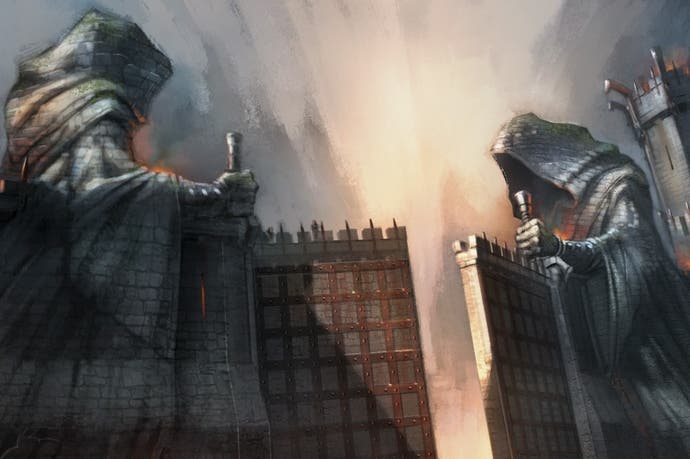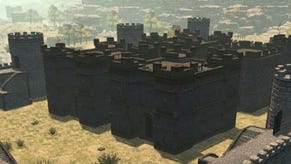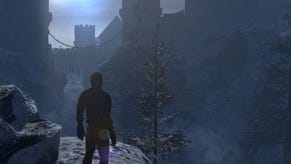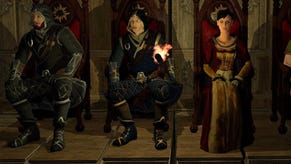Richard Garriott's Shroud of the Avatar: What's the big idea?
Why he needs Kickstarter, the project's origins, clever bits, persistence, online elements, housing, PVP and combat.
Richard Garriott, the creator of Ultima, the space man. He's not everyone's cup of tea, especially when he says things like "most game designers just suck" (even if there was a reasonable point buried underneath).
But clearly he does have a talent worth shouting about, because people are willing to listen to him shouting and even respond with large sums of money. Garriott's Shroud of the Avatar: Forsaken Virtues Kickstarter funding drive has passed its $1 million funding target with 12 days to go (current total: $1.17 million).
"We're hoping, of course, to go well beyond the minimum target," Garriott told me about a week ago. "Hopefully we'll get at least close to $2 million. If we went above that I'd be thrilled." And there's a good chance Shroud will, taking into account the typical upswing in funding towards the end of Kickstarter projects.
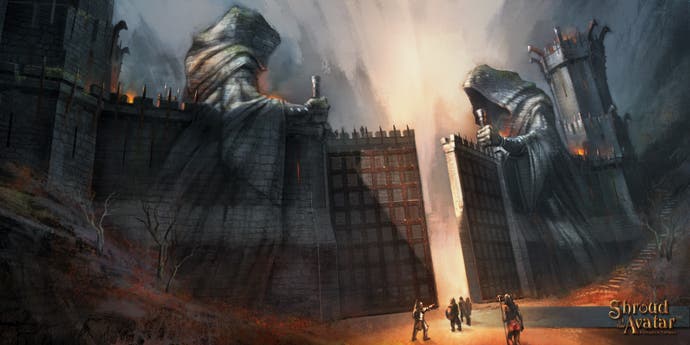
But he's loaded - why does he need Kickstarter?
"I'm not sure people have a correct understanding of what I call my personal finances," Garriott told me. "Nor am I really prepared to discuss them. But suffice to say the following, which is, I have and continue to support this company and this project to the tune of millions of dollars."
How much has he invested in Shroud of the Avatar specifically?
"It's hard to tell," he answered. "I don't think we actually split out our accounting on an individual process. But we've got millions into the organisation by all means, and a good chunk of that toward Shroud."
Even with that money, however, Shroud had to pick between a publisher or crowdfunding in order to be properly finished and marketed. Unsurprisingly - and like so many before him - Garriott and Portalarium picked Kickstarter. It means no publisher interference, and it means invaluable player feedback. "We want and need to hear from players early so that we don't waste our time building features they're not going to use," Garriott told me.
All told, Shroud will probably cost around $5 million. "That's probably where we'll be. Something to the order of $5 million - plus or minus $2 million, who knows?" That, incidentally, is how much Ultima Online cost to make ($5-6 million). "Tabula Rasa," he said, "was $10-20 million, something around there."
"I have and continue to support this company and this project to the tune of millions of dollars."
Richard Garriott
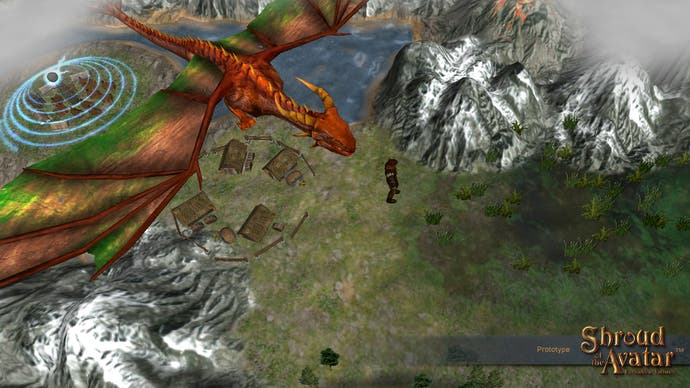
Shroud of the Avatar
Shroud of the Avatar is Ultimate RPG, the game he was getting around to after social game Ultimate Collector and gambling game Port, Casino, Poker - both effectively facades behind which Portalarium tested technology and experimented with features. And made some money. Ultimate RPG was at one point announced as a Zynga-published game. What happens there now, I do not know.
Shroud of the Avatar/Ultimate RPG began with an essay entitled, "What is a Lord British 'Ultimate' Role-Playing Game?" Garriott wrote that, and he ended up also sharing it on Facebook back in November 2011. "Then we started really assigning team members beyond myself and a couple of designers about six months ago," he said, "and the team has been slowly ramping up since. Most of the Portalarium activities right now are on Shroud of the Avatar."
Portalarium is a studio of 20-25 people. One thing the Kickstarter cash is being used for is hiring talent like author Tracy Hickman, a long-time friend of Garriott's.
The Shroud of the Avatar prototype you've seen is rudimentary, and it's not representative of the final game's look. "Most all of the art you see in there is art we got off of the Unity store and 3D off-the-shelf, buy-a-model-from-us sites. There's very little of our team's original art in there," explained Garriott.
There's only one concept artist and one modeller on the team at the moment. Kickstarter cash will change that. The visual benchmark for the world map of Shroud of the Avatar - the zoomed out top-down view - is Civilization 5. There isn't a visual benchmark for the over-the-shoulder action view, but Garriott said "we believe our engine is capable of creating scenes at the highest possible levels of visual quality".
That engine, incidentally, is Unity, and Garriott loves it.
"Most all of the art you see in there is art we got off of the Unity store ... There's very little of our team's original art in there."
How is it new, how is it clever?
It's got some intriguing online ideas. Shroud of the Avatar has an offline mode and three types of online mode that crescendo almost up to an MMO. It's not free-to-play nor is there a subscription fee. There will be a charge for the game and there may be a couple of ways you can spend real money in the game (maybe on housing). Garriott was very clear that Shroud wasn't a social game littered with micro-transactions, though.
The offline mode wasn't intended but players asked for it and so it happened. You can play Shroud of the Avatar: Forsaken Virtues offline all of the time if you want! But Garriott doesn't think you will.
He thinks you'll at least select Single-Player Online (SPO) mode, because there you can play it offline for extended periods while also benefitting from a world stored online and affected by other people. You'll see their houses in towns and their wares on their vendors stood outside their shops. And they'll see yours.
Plus, if you take the completely offline route, you'll never be able to use that character online. But you're free to switch between any of the three online modes - SPO, Friends Play Online (OPO) and Open Play Online (OPO).
On playing Single-Player Online offline, Garriott said: "You can't play indefinitely offline and then come back a year later and expect things to be approved, but we will let people play for periods of time offline and then validate their changes when they get back on.
"We're sure we'll be open to a little bit of hacking on that front and we're well aware of the dangers. I'm sure it will be a battle. But it's one we think is worth doing just because there's a lot of people - or at least me - who for sure want the ability to periodically play offline."
"...we will let people play for periods of time offline and then validate their changes when they get back on."
Friends Play Online allows you to play the game with your friends. Open Play Online opens you up to everyone. But everyone doesn't mean everyone. Shroud's world exists on a cluster of servers that make up a whole, rather than there being lots of smaller separate servers like in World of Warcraft. So in that sense everyone is together, but Shroud caps the amount of people you can be with in one area/scenario/instance. That cap isn't set, but 50 "is about right", apparently. "I would say that's a good guess. Until we actually have it running with that many people in it it will be hard to know whether that's a little conservative or a little light or heavy. But that's probably a pretty good target."
I stressed you because in Shroud of the Avatar players' computers host the scenario/instance/area and not the central servers. The 50 people in the scenario/instance/area will be relative to whoever is hosting based on an algorithm that has Friends at the top, and then guildmates, people you've grouped with, people you've interacted with, people you've sent tells to, people who've set their PVP tag and, finally, people similar in power.
In theory it works like this. There are two people in the world and they happen to be friends. Let's say one is called Tom and one is called Bertie. Tom ventures into the top-down world map. His game client checks to see if anyone else is running that world map. Oh look, Bertie is! So Tom joins Bertie's map. If Tom starts a scenario from that map by interacting with a place of interest, his client checks again to see if anyone is already running it. If not, Tom hosts the scenario. For Bertie's part, he would then see a marker on his world map where that scenario is running. If he joins in, he ends up connecting to Tom. Simple really.
By doing it this way - sharing the load between players' clients and not the servers - Garriott and Portalarium can keep infrastructure costs down. (Having the client run more or less independently on your computer means offline play is possible, too.) It also means that servers are doing fewer tasks so they should be more responsive. The strain on your machine shouldn't be too great either, because a friend doesn't require processing power to think like an AI character does. "But that is why there's some limit," said Garriott, "because we wouldn't put 1000 NPCs on your machine and we wouldn't put 1000 real people on your machine."
One of the stretch goals Garriott mentioned was the ability to group with your friends' avatars in asynchronous multiplayer - i.e. when they're not online. I can't see it mentioned on Kickstarter at the moment.
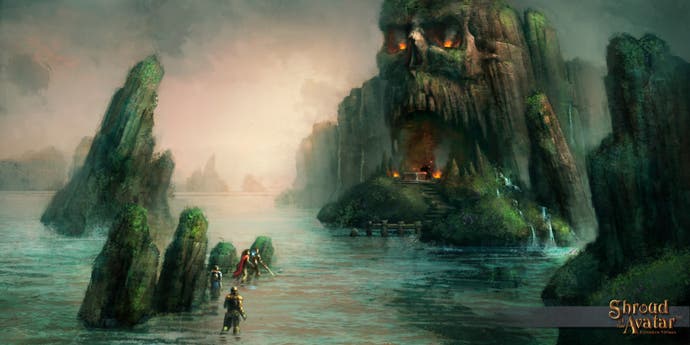
Affecting the world
By having a world map with pockets of separate content on - i.e. content within its own virtual walls that you'll need to load to get to - Garriott and his team can add and remove and tinker with things without fear of wide-reaching collateral ramifications.
"We can bring new islands into existence, we can bring entire towns into existence, we can take a mountain range and have it erupt into volcanoes through the centre, we can add dragon caves and lairs throughout it," he speculated.
Towns and cities can be sacked by the AI evil sweeping across the land, too. "That could be the town you live in, and so your house and your shop and all the NPCs in your town and all the friends you have in that town... Your town might be completely under siege and, at least for a period of time, you really will have no access to any of the things in that town including your own house."
Your house won't be trashed and eventually you'll regain access, but how long that takes depends on whether you wait for the mysterious enemy to move on or you gather a force and fight them.
"Your town might be completely under siege and ... you really will have no access to any of the things in that town including your own house."
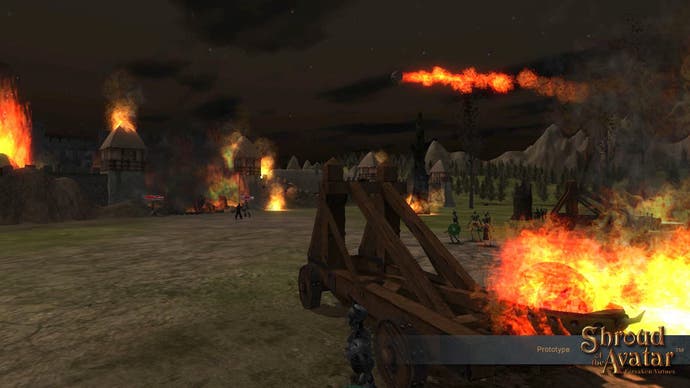
Housing
Deeds are the crucial part of housing. You need one to claim a lot of land to build a house on it, and there are "reasonable odds" that all the deeds will be taken by Kickstarter backers by the time Shroud launches. This is because housing is persistent on Portalarium's servers and so manifests in a tangible cost.
"Housing is something that will persistently change the world that you will now own on our servers, and because that costs us to maintain, we don't think we can just make that forever for free," Garriott said to me.
Securing a deed via Kickstarter means paying real money - the lowest tier I can see that mentions a house is $500, and that's a village-level deed. Cities are the best and strongest, towns next, villages last. You have to donate $1500 to get a town-level deed, and $3000 to get a city-level deed.
"If you remember in Ultima Online, real estate was actually one of the highest value real-world money transactions that ever took place in the game," Garriott recalled. "The real estate in Shroud of the Avatar is far more limited than it was even in UO."
Garriott seemed to be suggesting a real-money transaction for a house there, but a subsequent post about housing on Kickstarter didn't mention it. There it says new deeds may come available for in-game currency but they'll be rare and cost, likely, an arm and a leg.
"The real estate in Shroud of the Avatar is far more limited than it was even in UO."
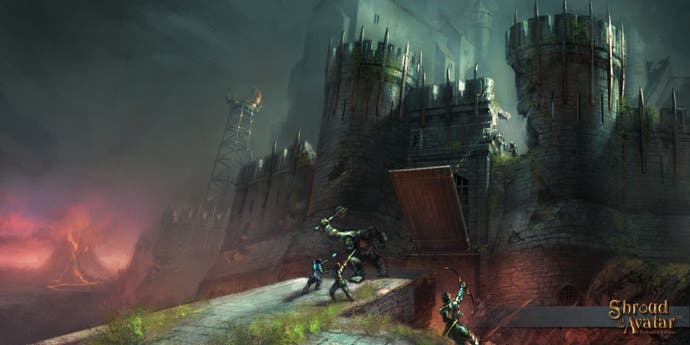
Player versus Player (PVP)
In the early days of Ultima Online there were relatively few restrictions on PVP. There was a very real risk of being killed while you were adventuring and having your equipment taken by your killer. It was exciting. But it wasn't for everyone.
Garriott hasn't decided how PVP and death will work in Shroud of the Avatar yet. He's got backers on Kickstarter arguing from both ends of the spectrum. But he doesn't want to do either extreme.
"We actually felt that UO was a bit too open," he said, "in that what would generally happen was the PKers (player-killers) were often preying on literal newbies. And as much fun as that might have been for some, it also ran off a huge fraction of the market.
"We really just can't afford to create a game that has the level of preying on beginners that UO did. We don't intend to go down that path so much."
Opt-in style PVP that's common in many MMOs today also isn't to his liking.
"You can't always do what everyone claims they want, because everybody would always want it to be easier," he considered. "But if you make it too easy, and the challenge goes away, then people aren't compelled to start either. It's very difficult to interpret player desire, player statements, player action with what you really probably should do for the health of the community and even the enjoyment of that one individual."
Shroud of the Avatar will try to do story-driven PVP. "We're building a game that will start you in a condition of relative safety, but that as you progress through the game, encourages - if not forces you - to accept danger, especially if you want to explore certain areas of plot threads or you want to deal with the most valuable resource opportunities."
You might be approached by an NPC offering you a cash-rich quest to deliver a package, but that package will be contraband. If you accept, other people will be told to try and stop you. "We literally will inform other people that, 'Hey, by the way, somebody has elected to make this run of contraband,' and someone else is given a mission to stop you."
There will be geographical hot-spots rich in resources where the rewards are as great as the dangers, too, and statistic-based player-titles like Dread Lord - handed out in Ultima Online after killing a lot of blue (good) players - will be present in Shroud of the Avatar as well. They won't, however, be exactly the same.
"You can't always do what everyone claims they want, because everybody would always want it to be easier."
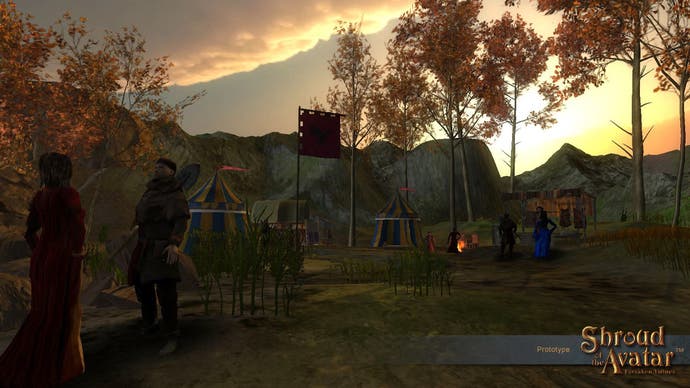
Skills and combat
For Shroud of the Avatar's combat, Garriott is drawing inspiration from tabletop card games. As you gain experience you unlock skills in a skill tree. You can select those skills - as many as you like - for combat. But you can only use those skills when they appear, at random, during combat. Therefore the more skills you select, the lower the chance you will get the skill you want.
If you choose situation-specific skills - like an opening-move backstab, a finishing-move execute or a multiple-enemy-hitting roundhouse kick - then you require them to appear during specific situations as well. But it sounds like you'll have no control over that.
"In the actual heat of battle we're going to have those skills come available to you through a system of revealing, which is not that they're all there all the time," explained Garriott. "They become available to you - they randomly come to your mind at various times. And sometimes it will be the ones that are of great use at that moment, and sometimes it's ones that aren't of use at that moment."
"We'll have to play it to determine [whether skills will appear randomly]... If I was speculating, I'd say any of the ones you've tagged can come up at any time, because we want that to be part of the logic of you saying whether I want to tag those or not.
"If you're going to use the opening strike and finishing blow, well you probably don't want to put a bunch of other junk in the middle because those are not going to come up often enough."
Doesn't that then become a game of chance?
"I don't think so, because what it does is it moves then into preparation. If you and I are going to PVP, I have to now sit down and think about well, who is this person, what is the nature of the combat we're going to have with each other, what do I know about that person and the things he's going to likely bring to bear?"
The skills themselves sounds like they'll be manouevres or spells with tactical utility such as a hook on a sword to pull shields away. This will tie in with player-crafting, because you'll need to find a sword with a hooked end in order to use that ability. That's the gist of it. Garriott's big on crafting and wants player-made items to stand out as unique as much as possible. He hasn't nailed down the specifics yet, though.
"In the actual heat of battle we're going to have those skills come available to you through a system of revealing which is not that they're all there all the time."
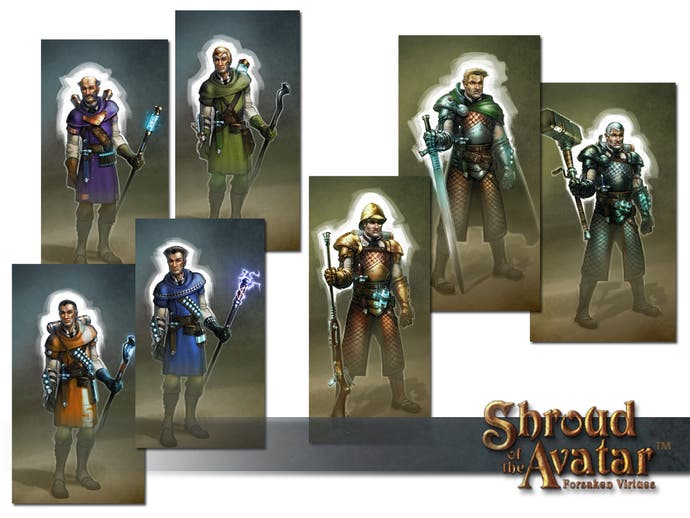
The future
"Forsaken Virtues is as big as any Ultima," Garriott told me, but it's only the beginning of Shroud of the Avatar. There will be more parts, and they'll all be roughly as big: 40 hours, judging by Garriott's recent comments on Reddit.
When I spoke to him, he added: "We're writing a sequence of releases where we'll release basically another full Ultima-worth of content hopefully about once a year for five years. We're anticipating that [Shroud] may have some legs to it."
How will those other chapters be funded? Kickstarter?
"It depends. We'll have to determine that when we get there.
"What you're fundamentally doing with Kickstarter is pre-selling the game. If pre-sales seems like it would be needed then by all means we'd be happy to go back and do it again.
"We've enjoyed this process so well, and we've gotten such good information already. We've already turned two or three corners in the last two days just because of all the player interaction we've had. So I consider this already to be a very successful activity, not just in the money side of things."
It all sounds very interesting and is clearly going to resonate strongly with a particular brand of RPG player - as is kind of obvious given how well it's already been funded on Kickstarter - so it just remains to be seen how well it all holds together once it's implemented. I'll do my best to be there every step of the way to showcase its progress, especially if they insert any more of my beloved dragons.
Then, one day, it will be finished, and we'll all get to turn our critical eye on Shroud of the Avatar and answer the important question that Garriott has, through his public comments, implicitly posed for his own actions to answer:
Does Richard Garriott suck at game design?
Hopefully the answer is no.
